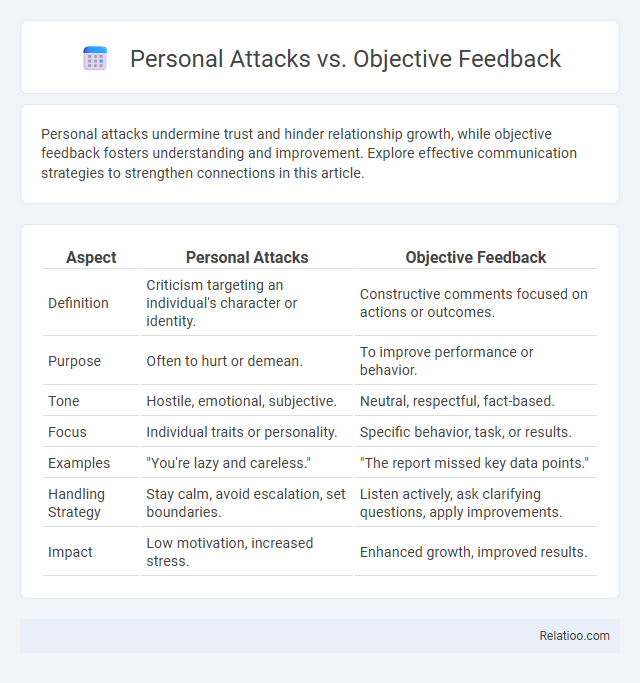Personal attacks undermine trust and hinder relationship growth, while objective feedback fosters understanding and improvement. Explore effective communication strategies to strengthen connections in this article.
Table of Comparison
| Aspect | Personal Attacks | Objective Feedback |
|---|---|---|
| Definition | Criticism targeting an individual's character or identity. | Constructive comments focused on actions or outcomes. |
| Purpose | Often to hurt or demean. | To improve performance or behavior. |
| Tone | Hostile, emotional, subjective. | Neutral, respectful, fact-based. |
| Focus | Individual traits or personality. | Specific behavior, task, or results. |
| Examples | "You're lazy and careless." | "The report missed key data points." |
| Handling Strategy | Stay calm, avoid escalation, set boundaries. | Listen actively, ask clarifying questions, apply improvements. |
| Impact | Low motivation, increased stress. | Enhanced growth, improved results. |
Understanding Personal Attacks and Objective Feedback
Understanding personal attacks involves recognizing when criticism targets your character or identity instead of specific actions, which can trigger defensive emotions and hinder productive dialogue. Objective feedback focuses on observable behavior or outcomes, offering constructive insights to improve performance or skills without personal judgment. Maintaining emotional boundaries helps you separate your self-worth from the feedback received, enabling growth and clear communication while minimizing stress.
Defining the Line: What Constitutes a Personal Attack?
Personal attacks occur when criticism targets your character, motives, or identity rather than addressing behaviors or outcomes, contrasting with objective feedback that focuses on specific actions and their effects. Establishing emotional boundaries involves recognizing when comments cross from constructive critique into harmful personal judgment, helping you maintain clarity and self-respect. Understanding this distinction empowers you to respond effectively and maintain professional and respectful communication.
Key Traits of Objective Feedback
Objective feedback emphasizes specific observations, measurable outcomes, and actionable suggestions that promote growth without personal judgment. It separates the behavior or result from the individual, ensuring your self-worth remains intact while addressing areas for improvement. Maintaining emotional boundaries allows you to receive objective feedback constructively, fostering a healthy response and continuous development.
Psychological Impact: Personal Attacks vs. Constructive Criticism
Personal attacks trigger heightened emotional distress and defensiveness, often leading to decreased self-esteem and impaired mental well-being. In contrast, constructive criticism promotes personal growth by offering specific, actionable feedback that supports positive change without attacking the individual's character. Maintaining emotional boundaries protects individuals from psychological harm by distinguishing between objective feedback aimed at improvement and personal attacks that undermine confidence and trust.
Common Scenarios Where Feedback Turns Personal
Feedback often turns personal during workplace critiques when comments about performance are misinterpreted as attacks on character, blurring the line between objective feedback and personal judgment. You must recognize common scenarios such as emotionally charged meetings, ambiguous language, or feedback delivered publicly that can trigger defensive responses and violate emotional boundaries. Establishing clear communication protocols and focusing on behavior rather than intent helps maintain a professional atmosphere and encourages constructive growth.
Techniques to Deliver Objective Feedback
Techniques to deliver objective feedback include focusing on specific behaviors rather than personal traits, using measurable data or examples to support observations, and maintaining a neutral, respectful tone to prevent defensiveness. Emphasizing the impact of actions on goals or team dynamics helps keep the conversation constructive and solution-oriented. Setting clear emotional boundaries ensures that feedback is fact-based and avoids personal attacks, fostering a productive and professional dialogue.
The Role of Language in Feedback Dynamics
Language plays a crucial role in distinguishing personal attacks from objective feedback, as using neutral, specific terms fosters constructive dialogue while inflammatory language triggers defensiveness. Your ability to set emotional boundaries and choose words thoughtfully helps maintain a safe space for growth, ensuring feedback targets behaviors rather than personal traits. Clear, respectful communication cultivates mutual understanding and supports emotional regulation during challenging feedback interactions.
Strategies to Respond to Personal Attacks
Effective strategies to respond to personal attacks include maintaining emotional boundaries by recognizing the attack as a reflection of the aggressor's issues rather than your personal worth. You can counteract the negative impact by calmly addressing the behavior and redirecting the conversation towards objective feedback and constructive dialogue. Prioritizing clear communication helps protect your mental well-being while promoting a respectful environment.
Fostering a Culture of Objective Communication
Fostering a culture of objective communication requires distinguishing personal attacks from constructive feedback and respecting emotional boundaries to maintain a respectful environment. Objective feedback focuses on specific behaviors or outcomes, enabling You to improve without feeling criticized personally. Clear emotional boundaries help prevent misunderstandings and encourage open dialogue based on facts rather than emotions.
Long-Term Benefits of Objective Feedback in Personal and Professional Growth
Objective feedback fosters long-term personal and professional growth by providing clear, actionable insights that help you improve skills and build resilience without the detriments of personal attacks. Establishing emotional boundaries ensures that feedback is received constructively, preventing emotional reactions from hindering development. Prioritizing objective feedback cultivates a growth mindset, ultimately enhancing communication, performance, and relationships over time.

Infographic: Personal Attacks vs Objective Feedback
 relatioo.com
relatioo.com